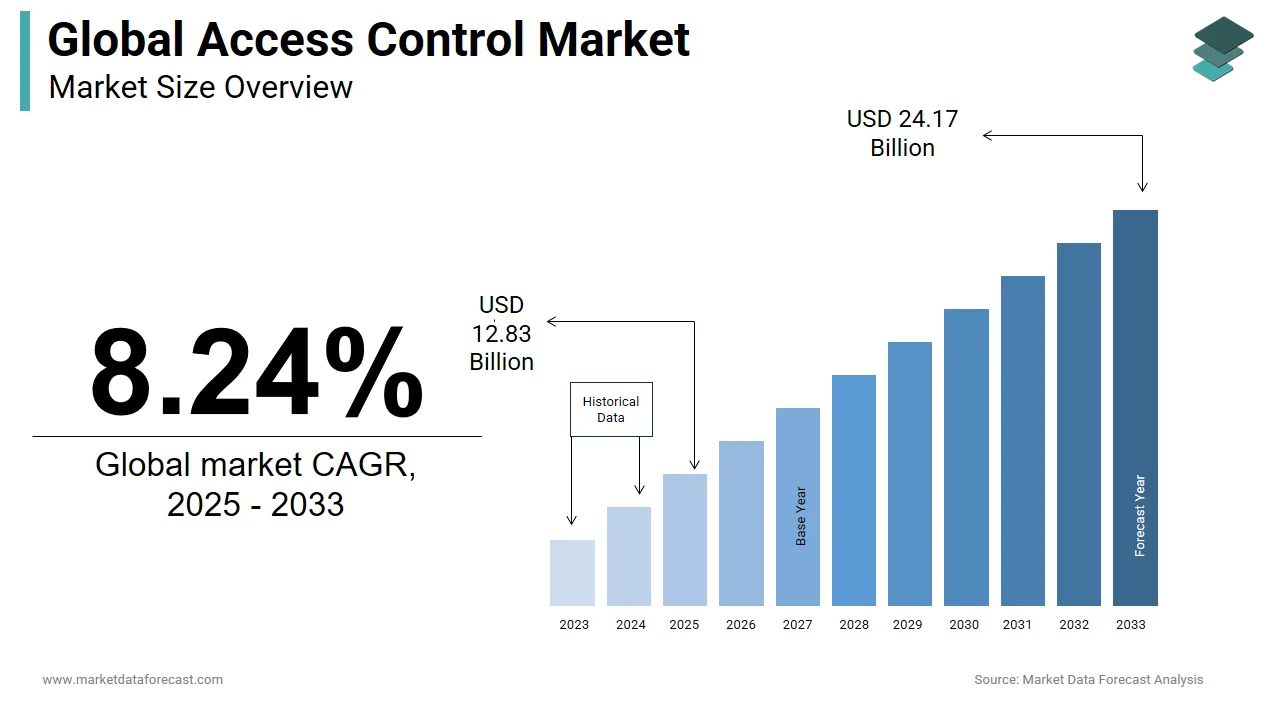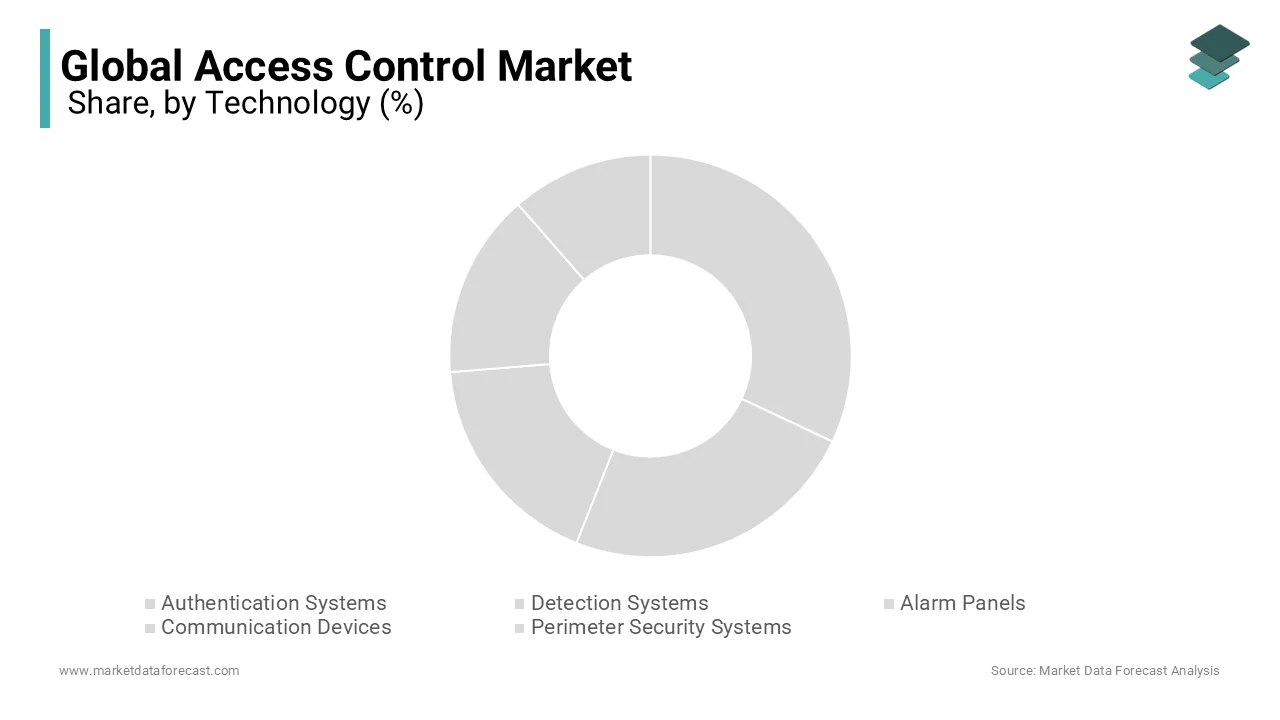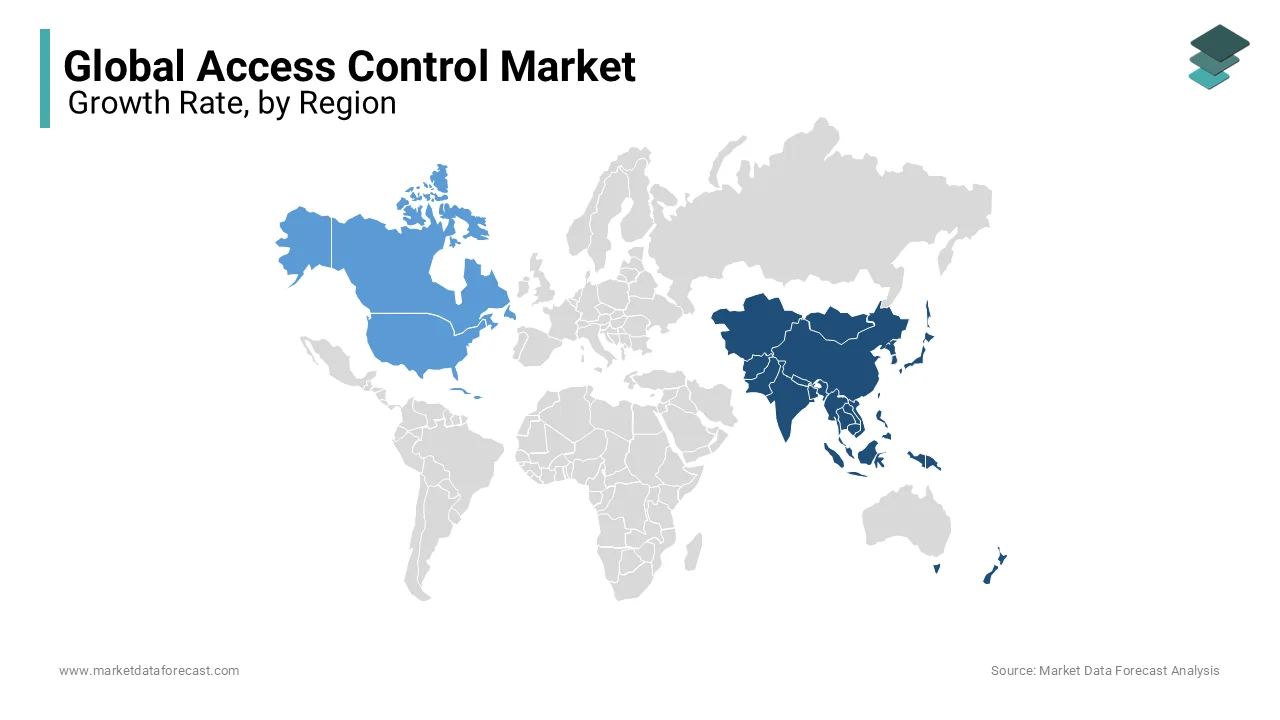Global Access Control Market Size, Share, Trends, Growth Forecast Report - Segmented By Technology (Authentication Systems, Detection Systems, Alarm Panels, Communication Devices, and Perimeter Security Systems), End-User (Internal, Commercial, Industrial and Residential Security), & Region - Industry Forecast From 2024 to 2032
Global Access Control Market Size (2024 to 2032)
The size of the global access control market was worth USD 10.95 billion in 2023. The global market is expected to grow from USD 11.85 billion in 2024 to USD 22.33 billion by 2032, growing at a CAGR of 8.24% during the forecast period.

Current Scenario of the Global Access Control Market
Access control prevents harmful viruses and intruders from misusing personal data by offering security from hacking. The increasing security threat across the globe, technological progressions, and rise in urbanization are a few factors promoting the access control market. Access control includes several products like electronic locks, biometrics, proximity, servers, smart cards, and so on. Many corporate employees use mobile devices to access their corporate data, increasing the risk of being attacked. Recently, access control, such as smart cards, biometric data and others, is used to protect against criminal and terrorist activities. Contactless access controls are increasingly employed in industries like construction, oil and gas, and processing plants. The deployment of wireless techniques in the security system is a pivotal element for the target market. Wireless access control sends information through a wireless radio signal, where these wireless sensors are portable and track all kinds of unique things around the house, with real-time alerts that 'they keep up with what's going on. In addition, wireless intrusion detection and prevention systems assist in avoiding security breaches by alerting the administrator of the network.
MARKET DRIVERS
The growing usage of access control in the healthcare industry is propelling global market growth.
With regard to end-user industries, the health sector should stimulate technological transformation within the market. Essential health information may be linked to a duplicate or incorrect medical record. This affects patient safety and the reputation of the hospital. The rise in the number of data breaches in U.S. healthcare has resulted in the adoption of biometric analytics. In 2018, companies like Qualcomm Life, Philips, ForgeRock, Arm, Sparsa, and U.S. TrustedCare declared that they joined hands to develop "OpenMedReady," a standards organization that aims to ensure the accuracy of patient data used by health professionals. They said recognition of fingerprints on smartphones is likely to be a key part of their framework as a means of directly linking medical data to patients. Restricting direct access to private health information is a prominent way to increase the overall security of patient data. Multifactor authentication, which requires users to verify their identity using two or more validation methods, is one of the most recommended approaches that a health sector can use.
The growing need for high-alert security in the corporate world is expected to fuel the growth of the global access control market in the future.
Due to technological developments and increasing urbanization, the incidence of data piracy has increased. This, in turn, should stimulate the market in the future. One of the main drivers of the global market is the growing threat of hacking worldwide. With the increase in the rate of criminal and terrorist activity, the demand for access control is expected to drive growth in the global access control market. The advanced level of data security involves access to corporate information, which is also determined to develop in the following years. The growth of the global access control market is further driven by the high adoption of access control solutions due to rising crime rates worldwide, technological advances, and the deployment of wireless technology in security systems. Also, the deployment of IoT-based security systems along with cloud computing platforms is promoting the growth potential in the global access control market.
REPORT COVERAGE
|
REPORT METRIC |
DETAILS |
|
Market Size Available |
2023 to 2032 |
|
Base Year |
2023 |
|
Forecast Period |
2024 to 2032 |
|
CAGR |
8.24% |
|
Segments Covered |
By Technology, End User, and Region |
|
Various Analyses Covered |
Global, Regional & Country Level Analysis, Segment-Level Analysis, DROC, PESTLE Analysis, Porter’s Five Forces Analysis, Competitive Landscape, Analyst Overview on Investment Opportunities |
|
Regions Covered |
North America, Europe, APAC, Latin America, Middle East & Africa |
|
Market Leaders Profiled |
Morpho SA, Assa Abloy AB, Siemens Building Technologies, Gemalto N.V., Honeywell Security Group, NEC Corporation, Kaba International Holding AG, Tyco International Plc, Crossmatch Technologies, Inc., Identiv, Inc., Gunnebo Group, Allegion Plc, Amag Technology, Inc., and others. |
SEGMENTAL ANALYSIS
Global Access Control Market By Technology

REGIONAL ANALYSIS

The access control solution has been widely adopted in the past decade in various industries, businesses, and residential properties in North America, Europe, Asia-Pacific, and the rest of the world. Of these, Asia-Pacific is predicted to grow with the highest CAGR during the forecast period. The growth of the Asia-Pacific region is due to greater acceptance by foreign companies that establish their manufacturing plants. Thanks to this, several regional and local IT companies and companies have been created, which should create a need for more security for your assets. In nations like China, Japan, and India, there has been a huge revolution in residential characteristics. The main growth factor for residential access control is urbanization.
Moreover, countries like the USA, Canada, Germany, and the United Kingdom have already established markets. These countries and some other European countries were the first to adopt the access control solution in offices and residential premises. North America was the dominant region 2017 due to planned residential areas, office space, and commercial and government properties. However, recent immigration to the United States has placed many citizens at risk of theft or intrusion into the perimeter. This has also resulted in the expansion of the access control market in the United States.
KEY PLAYERS IN THE GLOBAL ACCESS CONTROL MARKET
Companies playing a major role in the global access control market are Morpho SA, Assa Abloy AB, Siemens Building Technologies, Gemalto N.V., Honeywell Security Group, NEC Corporation, and Kaba International Holding AG. Other key players influencing the global market include Tyco International Plc, Crossmatch Technologies, Inc., Identiv, Inc., Gunnebo Group, Allegion Plc, and Amag Technology, Inc.
RECENT HAPPENINGS IN THE GLOBAL ACCESS CONTROL MARKET
-
In April 2019, Honeywell presented its latest fire and security products at the ISC West 2019 stand. OmniAssure™ Touch is a new range of passive access control readers developed by this firm. Honeywell aims to offer safety innovations to people that use connectivity to create a safer environment.
-
In March 2019, NEXT Biometrics partnered with UniComm, a developer and integrator of IT security, which can sell its biometric access control solutions on the Russian market. NEXT's fingerprint scanning technology can help UniComm meet customer demand for best-in-class solutions, helping them overcome today's challenges and stay ahead.
DETAILED SEGMENTATION OF THE GLOBAL ACCESS CONTROL MARKET INCLUDED IN THIS REPORT
This research report on the global access control market has been segmented and sub-segmented based on technology, end-user and region.
By Technology
- Authentication Systems
- Biometric
- Card
- Touch Screen and Keyboards
- Door Contacts
- Anti-Intrusion Alarm Systems
- Detection Systems
- Motion Detector
- Glass Break Detector
- Door/Window Sensor
- Alarm Panels
- Communication Devices
- Perimeter Security Systems
- Autonomous Perimeter Security
- Buried Perimeter Security
By End-User
- Internal
- Commercial
- Industrial and Residential Security
- Airports
- Financial Institutions
- Healthcare
- Telecommunications
- Stadiums
By Region
- North America
- Europe
- Asia-Pacific
- Latin America
- Middle East and Africa
Frequently Asked Questions
What are the primary drivers of growth in the global access controls market?
The primary drivers include the increasing need for security due to rising crime rates, advancements in technology (such as IoT and AI), stringent government regulations, and the growing adoption of cloud-based solutions.
What role does cloud computing play in the access controls market?
Cloud computing is playing a pivotal role by offering scalable, cost-effective, and efficient access control solutions. Cloud-based systems allow for remote management and monitoring, making them popular among enterprises of all sizes.
What are some key challenges faced by the access controls market globally?
Key challenges include high initial installation costs, privacy concerns related to biometric data, technical issues like system malfunctions, and the need for regular maintenance and updates.
What industries are the largest consumers of access control systems?
The largest consumers include the commercial sector (offices, retail), government buildings, healthcare facilities, educational institutions, and the residential sector.
Related Reports
Access the study in MULTIPLE FORMATS
Purchase options starting from $ 2500
Didn’t find what you’re looking for?
TALK TO OUR ANALYST TEAM
Need something within your budget?
NO WORRIES! WE GOT YOU COVERED!
Call us on: +1 888 702 9696 (U.S Toll Free)
Write to us: [email protected]